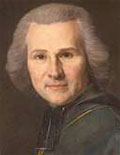 |
Baptiste-Henri Grégoire
b. 4 Dec 1750, Vého, near Lunéville, Duchy of Lorraine [1]
d. 28 May 1831, Paris, France |
| Title: |
Président de l'Assemblée nationale (President of the National Assembly) |
| Term: |
18 Jan 1791 - 29 Jan 1791 |
| Chronology: |
18 Jan 1791, election as president proclaimed by the National Assembly, session of the Assembly, Salle du Manège, Paris; assumed the chair immediately upon the proclamation of election [2] |
|
29 Jan 1791, expiration of term; successor elected and proclaimed [3] |
| Names/titles: |
Évêque constitutionnel du Loir-et-Cher (constitutional bishop of Loir-et-Cher) [17 Feb 1791 - 12 Oct 1801]; also styled himself évêque de Blois; comte Grégoire, comte de l'Empire (count Grégoire, count of the Empire) [from 25 Jul 1808] |
|
Président de la Convention nationale (President of the National Convention) (15 Nov 1792 - 29 Nov 1792) [see details] |
| Biography: |
| Born in a small village in Lorraine, where his father was a tailor; attended school in Emberménil, Meurthe; entered the Jesuit collège of Nancy (1763-1768); studied at the seminary of Metz (1769-1771); taught at the collège of Pont-à-Mousson (1771-1774); was ordained priest (1775) and became vicar of Marimont-la-Haute (1776-1782); was made curé of Emberménil (1782); published a number of works praised by the French academic institutions; gave a sermon in favour of the emancipation of Jews in France (1785); elected (27 Mar 1789) as a representative of the clergy of Nancy to the États-Généraux (Estates-General); was one of five clergy to join the sessions of the Third Estate as a deputy of the Assemblée nationale (National Assembly) (1789-1791) and took an oath in the Tennis Court (20 Jun 1789); elected President of the National Assembly (18 Jan 1791 - 29 Jan 1791); was among the most active deputies of the Assembly; advocated abolishing Negro slavery and granting citizenship to Jews; objected some provisions of the Civil Constitution of the Clergy, but agreed to swear the oath of allegiance and was the first to take this oath (1790); joined the Breton club, and then the Jacobin club, which he left briefly at the time of the Feuillant schism; was elected (13 Feb 1791) and proclaimed (17 Feb 1791) constitutional bishop in the départements of Sarthe and Loir-et-Cher, opted for the latter; was elected a member of the administration of the Loir-et-Cher (1791); elected from the Loir-et-Cher to the Convention nationale (National Convention) (1792-1795); put forward the motion for abolition of kingship (21 Sep 1792); elected a member of the Comité de sûreté générale (Committee of General Security) (17 Oct 1792 - 9 Jan 1793); proposed that King Louis XVI be brought to trial, but demanded the abolition of death penalty; was elected President of the National Convention (15 Nov 1792 - 29 Nov 1792); absent during the trial of Louis XVI; became an active member of the committee of public instruction and an opponent of refractory priests; vigorously opposed dechristianisation; was elected to the Corps législatif and sat in the Conseil des Cinq-Cents (Council of the Five Hundred) (1795-1798) as a representative of the département of Seine; disapproved the coup of 18 Brumaire, Year VIII (9 Nov 1799 - 10 Nov 1799); was elected to the Corps législatif (25 Dec 1799); served as President of the Corps législatif (5 Feb 1800 - 20 Feb 1800); resigned bishopric (12 Oct 1801); elected a member of the Sénat conservateur (25 Dec 1801); criticised the Concordat negotiated by Napoléon Bonaparte; served as President of the Sénat; opposed many actions of Napoléon Ier and voted for deposition of the emperor (1814); was elected to the Chambre des députés (Chamber of Deputies) (12 Sep 1819), but the election was annulated under the pressure of royalists (6 Dec 1819).
Biography source: [4][5] |
| |
| [1] |
Copy of birth record is cited in "L'abbé Grégoire, 1750-1789; discours de réception par M. Maggiolo" in Mémoires de l'Académie de Stanislas, 1872, 4e Série, Tome V (Nancy: Imprimerie Berger-Levrault, 1873), p. lv: "1750 le quatrième décembre est né Baptiste-Henry, fils de Bastien Grégoire et de Marguerite Thiébaut, ses père et mère; il a été baptisé le 5e du même mois..."; also in "Les années de jeunesse de l'abbé Grégoire", by Antoine Sutter (Sarreguemines: Editions Pierron, 1992), p. 15. |
| [2] |
Archives parlementaires. Série 1, , vol. XXII, p. 305. |
| [3] |
Archives parlementaires de 1787 à 1860, op. cit., vol. XXII, p. 565. |
| [4] |
Dictionnaire des Constituants, |
| [5] |
Dictionnaire des Conventionnels, pp. 308-311. |
|
Image: portrait by Pierre-Joseph-Célestin François (1800). |